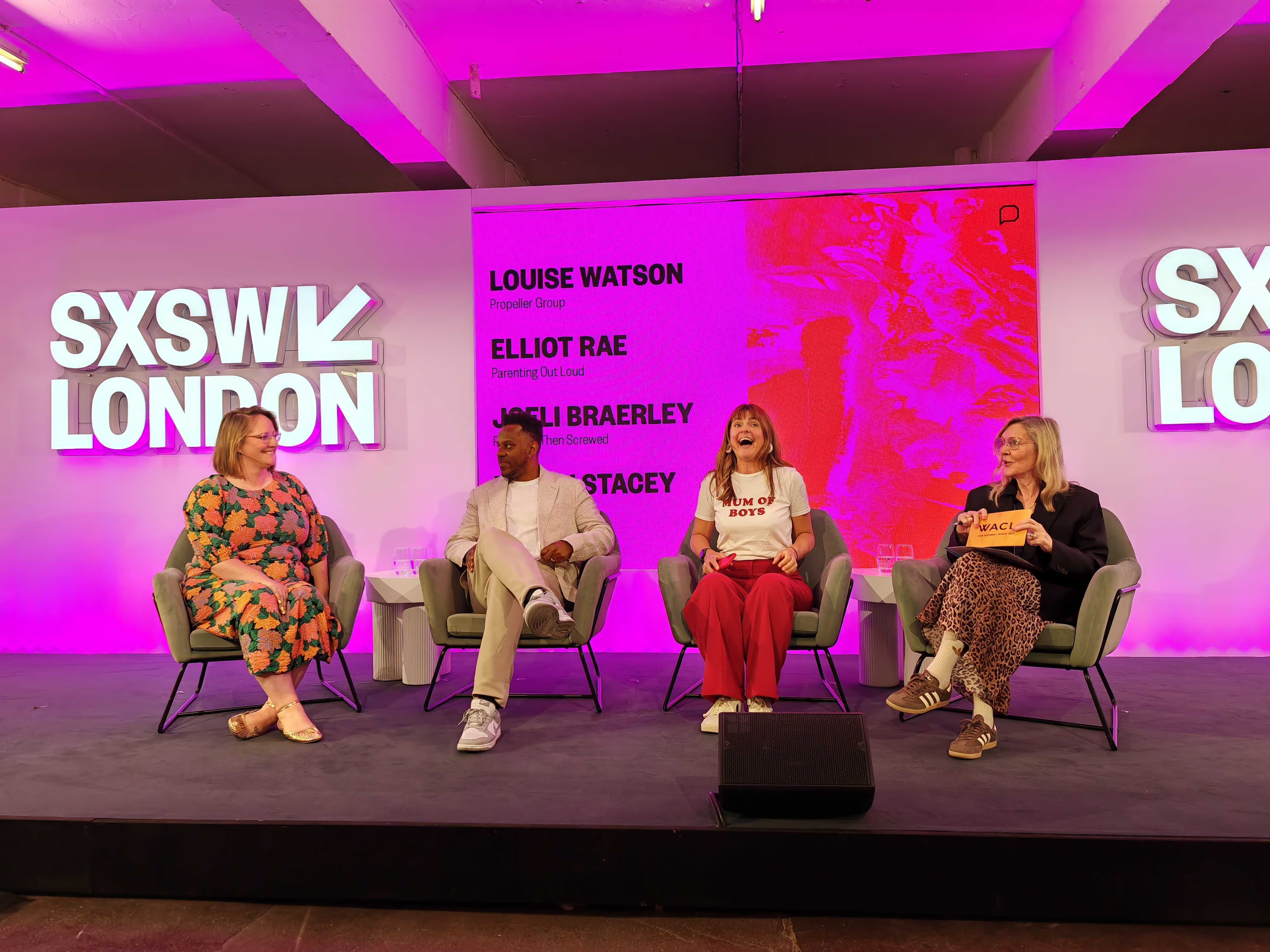They may not wear capes or fly around the world defeating extraterrestrial threats - but the stereotypical “Supermum” figure is just as impressive. After all, who else could seamlessly balance a career, family and everything in-between without breaking out in a sweat?
The answer: no one. “Supermum”is an unrealistic expectation that sees mothers become deified, facing huge pressure to strive for parental perfection (which can leave them feeling overwhelmed and despondent in the process). What’s more, allowing society to persist with this impossible standard means that the narrative will continue to overlook the role that dads play in the parenting equation.
That’s why we were thrilled to see Louise Watson, Associate Director at Propeller Group, tackle this issue head-on at SXSW. Louise had the opportunity to take part in the Moving on from the Supermum myth panel, which discussed how businesses can rewrite the script on parenting, equity and support. Alongside Louise were a host of leaders including:
- Karen Stacey - President of WACL and CEO at DCM (Moderator)
- Joeli Brearley - Founder at Pregnant Then Screwed
- Elliott Rae - Founder at Parenting Out Loud
Where was the idea born?
Each panellist had the chance to explain why this topic was so close to their hearts. Joeli Brearley spoke about the negative experience she endured during her first pregnancy: “My employer sacked me the day after I announced I was expecting. After trying to take legal action, it quickly dawned on me that the system wasn’t fit for purpose - which led to me founding the charity and campaign group Pregnant Then Screwed”.
For Elliott Rae, the mission is to revolutionise the conversation about working dads. “I want dads to be proud of their parenting responsibilities. But in order for this to become a reality, we need to create more spaces for them to be open about the challenges they face - and that enable people to be full human beings at both work and home.”
Louise Watson’s journey to championing parental rights didn’t stem from her own experience - but that of her husband. “Although I was fortunate to return to an incredibly supportive workplace after maternity leave, my husband had the exact opposite. We made the decision for him to take six weeks of shared parental leave, only for him to be replaced while he was away.
“Following the birth of my second child, I returned to work quickly to run a large project within our industry - which involved flying abroad with a six-month-old baby that was still breastfeeding. The “Supermum” phrase was bandied about regularly during this period, as if I was doing something completely normal, when this couldn’t be further from the truth.”
Room 101-ing “Supermum”
The discussion then turned to the reasons that the term “Supermum” should be confined to the history books. Joeli argued that it’s unfair to keep glorying mums that do everything - because they can’t.
“Many people forget that today’s parents are spending twice as much time with their children as they were in the 1950s. Not only that - we’re doing 300 more hours of paid work every year. That just isn’t sustainable; it’s hardly surprising that the majority of mothers I speak to find themselves constantly on the edge. The notion that we’re somehow ‘managing to do it’ simply papers over the cracks. It doesn’t address the root of the problem.”
Building on the point about society’s evolution, Elliott stressed that mothers aren’t the only victims of the patriarchy. “My work brings me into contact with men that want to do things differently. This is a generation genuinely invested in change. This desire doesn’t only come from how it benefits their partners or their children; they appreciate how it’s good for them, and how balance can lead to longer, happier lives. However, all of this requires facilitation.”
Louise echoed this sentiment, stressing that the current language isn’t conducive to progress. “The “Supermum” label prevents honest conversations from taking place about the struggles and challenges that women face, and the fact that they may need help. It also removes dads from the picture altogether, which isn’t representative of the countless men that want to be involved.”
Parting words of wisdom
In the closing moments, each panellist offered insights into the ways they wish they’d been supported on their respective journeys - and the advice that the rest of the world needed to hear.
Elliott emphasised the role of community, and how this doesn’t have to be confined to your existing day-to-day circles. “While it’s certainly important to have your friends and family act as a support network - don’t underestimate the power that stems from finding a tribe of like-minded people that you can relate to.”
Joeli used her final thoughts to guide businesses on what more they can do, while also demonstrating how her agency can assist. “The desire for flexible working, or wanting to build a career that works around your personal responsibilities, isn’t too much of an ask. Obviously, this level of support wasn’t available to me - which speaks to why I formed Pregnant Then Screwed, which can provide the necessary support (which is also free) for women that get shafted by their boss.”
This sense of open-mindedness was also the focal point for Louise’s parting message. “At Propeller, we’ve been working really closely together on what maternity and paternity leave should look like - and how we can tailor these to better support people in the business. Remember, this policy doesn’t have to stay still. As your organisation grows, there’s an opportunity to observe how the situation is evolving and respond accordingly.”
